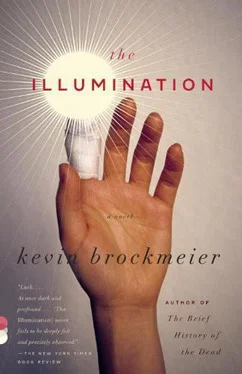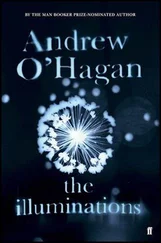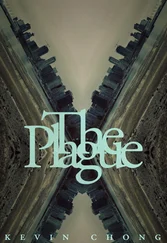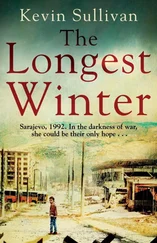——
The hospital’s main doors opened onto an atrium with a gently sloping ceiling of metal trimmers and polished glass. She kept looking up at the rain on the roof and then down at its reflection on the floor, hundreds of semitransparent shadows that flowed across the tiles like snakes. A bird had built its nest into one of the ceiling’s upper struts, and she wondered what it did on days like this: Did it tuck its head beneath its wings or just stand there stolidly and wait for the weather to turn?
She followed Dr. Alstadt down a chain of hallways and through the emergency ward, where a nurse was sorting patients into admission groups, saying, “Green group, green group, yellow group, green.” In the last few weeks, it seemed, the hospital had established a system of treating patients based on the strength of the light emanating from their bodies. The Illumination had ushered in a new age of critical care. Doctors no longer had to rely on their patients to tell them how badly they were suffering. “Head light and heart light take priority, of course,” Dr. Alstadt told her, “along with any obvious major traumas. Then we take all the other lights and make a visual determination of their severity.”
The walls were tilting toward Carol Ann suddenly. She became aware that he had paused between sentences, and she made the noise she seemed to recall normal people making when they wanted to show an interest in something. The doctor steadied her with his hand. “Good Lord. You’re really not feeling well, are you? Let’s get you a bed.”
He showed her into an examination room.
“You rest here a minute, and I’ll go find the vascular specialist.”
The curtains ballooned outward as he left, then settled back against the window. She saw that the pain assessment chart, with its six faces transforming from glee to agony, had been taken down from the wall. It was no longer necessary, she supposed, now that the Illumination had taken hold. She felt a pulse of blood traveling through her thumb, too much of it for so small a space, and she closed her eyes and waited for the twinge to pass, and before long Dr. Alstadt had returned with a young Indian man he introduced as Dr. Kimberley, his neck starlit with a fresh shaving rash.
Dr. Kimberley said, “I understand your injury has been misbehaving on you, Miss Ann-Page. Let’s see what we can do about that. May I?” He removed her glove and took the base of her thumb between his fingers, pressing against the two indentations the splint’s metal stays had left there, compacted to a smooth pale sheen. He was like a carpenter using a wood clamp, and as he tightened his grip, she watched her thumb change colors, instantly reddening below the line of the cut and gradually pinkening above it.
Dr. Alstadt made a grimacing noise with the corners of his mouth. Dr. Kimberley shook his head. “You see,” he said. “This is what happens when you skip your follow-up appointments.”
“But I didn’t skip my follow-up appointments. I had a follow-up appointment last week. I have another follow-up appointment on Thursday.”
“Oh. Well. Then sometimes these things happen.”
The rest of it seemed to transpire very quickly. Once again she was given a shot in the crook of her elbow, and once again her skin began to tingle, and once again she had the sensation that all her life until just that moment she had been falling toward the ground and suddenly, instead, she was floating above it, and the world looked so handsome, and the light so sweet and welcoming, and she cried as she lay there waiting for the orderlies to take her into the strange, blue, humming, capacious elevator. When she woke up and tried to wipe the grit from her eyes, she found that there was a boxing glove on her hand, and then her mind cleared and she realized that the boxing glove was a bandage, wrapped so tightly that it had fixed her fingers together into a sort of trowel. A machine beeped next to her left ear. A woman in dark green nursing scrubs came in to check on her. When Carol Ann asked her how the operation had gone— where was her glove? could she go home now? —the nurse looked at her chart and said, “Maybe we should wait for the doctor to explain things to you,” and then, “Calm down, now, Miss, calm down. There’s no need for us to raise our voices, is there?” and finally, “I’m sorry to tell you this, but your thumb has been amputated at the knuckle.” It took almost a full minute for Carol Ann to understand that the schools of fish swimming in slow spasms across her vision meant that she was holding her breath. The nurse opened a water bottle, placed a pair of the blue pills on her tongue, and helped her swallow them. Then came the long hours of careless assent and easy reminiscence she had dreamed about while she was sitting behind her desk at work. Memory after memory leafed open in her mind like buds on a tree. The time she found her babysitter rubbing one of her mother’s bras against his cheek. The night she spilled her popcorn on the usher at the movie theater. The Matisse and Duchamp posters with which her college roommate had decorated their dorm room. The fountain outside the library where someone had arranged the coins to spell Mike Rules! Her recovery suite had a single bed this time, and she could run the lamp or change the position of her mattress without fear of disturbing anyone. She did not recall turning the television on, but on it certainly was, and she watched two men in cheap suits debating how the Illumination had affected our duty toward animals, or “the lower creatures of the world,” as they kept calling them. One of the men’s ties was sending irritated little glimmers up his neck. An abscessed tooth was radiating from the other’s mouth. Every so often there was a film clip of a stack of poultry pens in the bed of a trailer, the wire cages giving off innumerable white flashes; or a jockey hieing a horse around a track, its knees and shoulders burning with the strain of the race; or a gang of children flinging gravel at a stray dog, beads of light opening on its body as it tried to twist out of the way.
Dr. Alstadt must have gone home already, because the girl who came to replace her bandages that night could not have been older than twenty-five, fresh out of medical school, her hair held back with a pair of tortoiseshell barrettes. At first Carol Ann was too apprehensive to look at what remained of her thumb, and she kept her eyes fixed on the ceiling until the girl was finished, but a few hours later, when the same doctor returned to change the dressing again, a nurse had fortified her with a second dose of the blue pills and she was able to investigate the amputation. It was not as gruesome as she had imagined it would be. She had a neat little half-thumb now, homely but not repulsive, the crease along the center sewn so tightly together that the stitching looked like one continuous black thread. The injury shone like a penlight where the tendons had been sliced apart, and she was aware of the pain, but she did not mind it nearly as much as she suspected she should. The doctor swabbed her thumb with a clear, sharp-smelling liquid that evaporated almost immediately, then cushioned and rewrapped it. She was saying something about the importance of keeping the area disinfected when Carol Ann drifted off to sleep.
She woke with a start. It was three in the morning. For a moment she thought she had left the television on, but the flickering she saw from the corner of her eye turned out to be her own arm, flung haphazardly over the pillow. Waves of light were following each other all the way from her hand to her shoulder, a display she might have found hypnotic if it hadn’t hurt so much. Her head ached, and so did her back. She was grinding her teeth, and there was an awful tightness in her stomach. Obviously, the pills had worn off, and with the sickness came the desperation—it had always been that way. The serenity she had accepted so naturally just a few hours before was gone now. She could hardly remember what it felt like. Here, in this place, her life seemed like one long litany of wounds, ending in these sweat-drenched sheets with half her thumb missing and stretching back through time in an unbroken sequence of bone fractures and muscle strains, sunburns and concussions, black eyes and canker sores. There was a light in her hand, and a light in her head, and doubtless a light in her memories, too. She had known days of happiness and beauty, rare moments of motionless wonder, but trying to relive them after they had vanished was like looking out the window at night from a partially lit room: no matter how interesting the view, there was always her own reflection, hovering over the landscape like a ghost. That face, it was the problem. Those eyes and that skin. She wished that she could throw the glass open for once and see things as they really were.
Читать дальше












